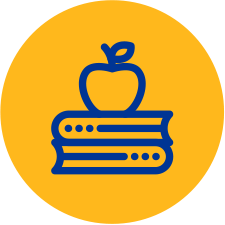Mutually Beneficial Experiences

Our School Hub model is designed to create a synergistic relationship where both the host schools and our teacher education program thrive.
Benefits for School Hubs (Host Schools):
- Access to Current Research & Best Practices: We offer workshops or professional development sessions led by university faculty on current educational research, innovative pedagogies, or specific challenges identified by the school (e.g., literacy strategies, differentiated instruction, classroom technology integration).
- Pipeline for Future Hires: School Hubs gain early access to a pool of highly trained, university-vetted teacher candidates, potentially leading to more efficient recruitment and hiring of new teachers who are already familiar with their school culture and student population.
- Increased Capacity & Support: Teacher candidates, under the guidance of mentor teachers and university coaches, can provide additional support in classrooms, assist with small group instruction, and contribute to school-wide initiatives, alleviating some workload for existing staff.
- Professional Development for Mentor Teachers: We provide ongoing, specialized professional development for mentor teachers within the hubs, focusing on coaching skills, feedback strategies, and leadership development. This could lead to a ‘Master Mentor’ certification or recognition program.
- Collaborative Problem-Solving: We establish regular forums where school administrators and teachers can collaborate with university faculty to address specific instructional challenges or develop new programs, leveraging the university’s expertise and resources.
- Resource Sharing: We share university resources like library access, research databases, or specialized equipment (e.g., educational technology) with hub teachers and staff.
Benefits for the Teacher Education Program (University):
- Authentic Clinical Experiences: Hubs provide consistent and high-quality field experiences in diverse school settings, allowing teacher candidates to apply theoretical knowledge in real-world contexts and develop practical skills.
- Enhanced Curriculum Relevance: Direct collaboration with schools ensures that the teacher education curriculum remains relevant and responsive to the current needs and challenges of K-12 education.
- Data for Program Improvement: Opportunities to collect data on teacher candidate performance and program effectiveness within a consistent hub environment can inform continuous program improvement and research initiatives.
- Stronger Recruitment & Retention: A well-regarded hub model can attract more high-quality teacher candidates by offering structured, supportive, and desirable field placements.
- Faculty Professional Development: University faculty gain valuable insights into contemporary school environments, which can inform their teaching, research, and service. They can also co-teach or co-plan with experienced K-12 educators.
- Community Engagement & Impact: Deepening partnerships with local schools strengthens the university’s community engagement efforts and demonstrates its commitment to improving educational outcomes in the region.
Through this collaborative School Hub model, we aim to cultivate highly prepared, adaptable educators who are ready to make a significant positive impact in diverse learning environments.





